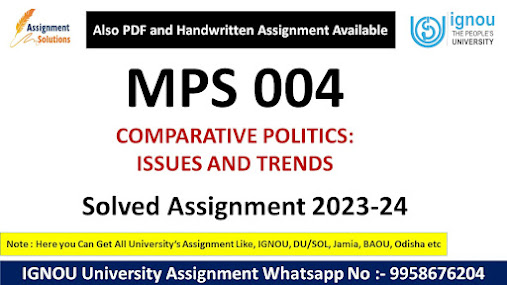MPSE 004 Solved Assignment 2023-24
MPSE 004 Solved Assignment 2023-24
SOCIAL AND POLITICAL THOUGHT IN MODERN INDIA
MPSE 004 Solved
Assignment 2023-24 : All assignments are in PDF format which would be send
on email/WhatsApp (9958676204) just after payment.
Course code: MPSE 004
Assignment Code: MPSE 004/ASST/TMA/2023-24
Marks: 100
There are three
Sections in the Assignment. You have to answer all questions in the Sections.
Assignment I
Q1. Discuss the nature
of state and sovereignty in ancient India.
In ancient
India, concepts related to the nature of the state and sovereignty, while not
identical to modern Western understandings, had their own sophisticated
framework influenced by the region's unique philosophical, cultural, and
historical contexts. Let's delve into the nature of the state and the concept
of sovereignty in ancient India.
1. Nature of the State:
Vedic Period:
The early Vedic period saw tribal or clan-based polities known as
"janapadas." The primary political unit was the tribe or
"jana," led by a chief or "raja." As society progressed and
became more complex, larger territorial units and more defined governance
structures began to emerge.
Mahajanapadas:
By the 6th century BCE, 16 major kingdoms or republics known as
"mahajanapadas" were established. These could be monarchies or
republics. The republics were often governed by assemblies of nobles or senior
clan members.
Empires: The
Maurya and Gupta dynasties represent the most notable imperial formations in
ancient India. During their reigns, there was centralization of power,
extensive administrative structures, and expansive territorial control.
2. Concept of Sovereignty:
Divine Right of
Kings: The concept of "divine right" wasn't alien to ancient India.
Kings were often seen as representatives of the divine on earth. They were
entrusted with maintaining dharma (righteousness) and ensuring cosmic and
social order.
Dharma: The
concept of dharma was central to governance. It referred to duties, rights,
laws, conduct, and virtues to be followed in life. For the king, it meant
ruling justly, protecting his subjects, and upholding societal order.
Dandaniti (Art
of Punishment): As discussed in the Arthashastra, an ancient Indian treatise on
statecraft, the ability to punish was one of the essential aspects of
sovereignty. This ensured the maintenance of social order and the proper
functioning of the state.
Mandala Theory:
Proposed by the Arthashastra, this described the political relationships
between a monarch and his neighbors. The king's state was the
"vijigishu" (the would-be conqueror), surrounded by a circle of
neighboring states. Understanding and navigating these relationships were
crucial for a ruler's sovereignty.
Constitutional
Aspects: While not constitutional in the modern sense, certain ancient Indian
texts delineated the duties and responsibilities of rulers. For instance, the
Dharmashastras provided guidelines on governance, the duties of a king, and the
various other aspects of statecraft.
Assembly
Governance: In some republics, the notion of sovereignty was collective. The
Sabha (assembly) or the Samiti (council) exercised decision-making powers. In
these cases, sovereignty was distributed among the senior members of the clan
or the community.
In conclusion,
the nature of the state and sovereignty in ancient India was multifaceted and
deeply influenced by its spiritual and philosophical ethos. Concepts like
dharma provided a framework that linked governance, morality, and cosmic order.
While distinct from Western notions of state and sovereignty, ancient Indian
political thought offers a rich tapestry of ideas on governance, duty, and the
nature of power.
Q2. Write an essay on
the construction of India in the 19th century.
Q3. Trace the
trajectory of Muslim thought in colonial India.
Q4. Elaborate upon the
religio–political ideas of Dayanand Saraswati.
Q5. Describe the
importance of Lal-Bal-Pal in the nationalist movement.
Assignment II
Q6. a) Sri Aurobindo
on Renaissance in Hinduism
b) V.D. Savarkar on
social reforms
Q7. a) Maulana
Maududi’s views on nationalism
b) Jaipal Singh as a
champion of Adivasi identity
Q8. a) Gandhi’s theory
of Trusteeship
b) Nehru’s theory of
culture
Q9. a) Dr. B.R.
Ambedkar on Constitutional Democracy
b) M.N. Roy’s Radical
Humanism
Q10. a) EMS
Namboodiripad on the strategy of Indian Revolution
b) Socialist thought
of Jayaprakash Narayan
MPSE 004 Solved
Assignment 2023-24 : All assignments are in PDF format which would be send
on email/WhatsApp (9958676204) just after payment.
POST GRADUATE DIPLOMA IN AUDIO PROGRAMME PRODUCTION Master's
Degree Programmes (M.A. (Political Science)) ASSIGNMENTS
Dear Learner,
You have to submit one
assignment in each course, i.e. MPSE 004 Solved Assignment 2023-24. All these
are Tutor Marked Assignments (TMAs). Before attempting the assignments,
please read the instructions provided in the Programme Guide carefully.
Kindly note, you have
to submit these assignments to the Coordinator of your Study Centre within the
stipulated time for being eligible to appear in the term-end examination. You
must mention your Enrolment Number, Name, Address, Assignment Code and Study
Centre Code on the first page of the assignment. You must obtain a receipt from
the Study Centre for the assignments submitted and retain it. Keep photocopies
of the assignments with you.
Also Check :
MPSE 003 Solved Assignment 2023-24
BCOC 136 Solved Assignment 2023-24
After evaluation, the
assignments have to be returned to you by the Study Centre. Please insist on
this and keep a record with you. The marks obtained by you will be sent by the
Study Centre to the Student Evaluation Division at IGNOU, New Delhi.
Guidelines for Doing
Assignments
There are five
questions in each assignment, all carry equal marks. Attempt all the questions
in not more than 500 words (each). You will find it useful to keep the
following points in mind:
Planning: Read
the assignments carefully. Go through the units on which they are based, make
some points regarding each question and then rearrange them in a logical order
Organization and
Presentation: Be analytical in your selection of the information for your
answer. Give adequate attention to the introduction and the conclusion. Make
sure that your answer is logical and coherent; has a proper flow of
information.
For IGNOU Solved Assignment PDF & Hand Written
Subscribe YOUTUBE : ASSIGNMENT SOLUTION
WhatsApp Contact : 9958676204


Post a Comment